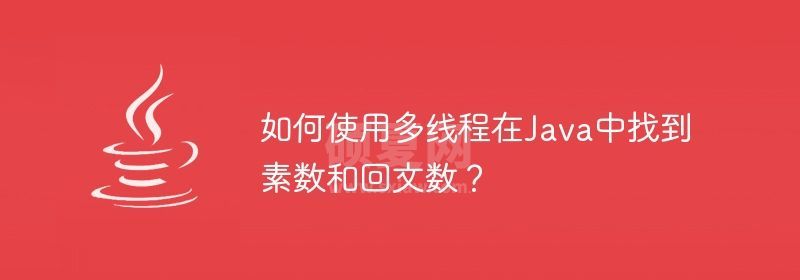如何使用多线程在Java中找到素数和回文数?

多线程是Java编程语言的一个特性,它允许我们同时执行多个操作。在多线程中,操作被分成多个较小的部分,称为线程。每个线程执行一个独立的任务,不会影响其他线程的性能。多线程的主要好处是对CPU等资源的最优利用,提高了分配操作的执行时间。
找到质数和回文数是每个初学者程序员都要执行的基本编程任务之一。然而,在本文中,我们将以一种令人兴奋的方式完成相同的任务。我们将讨论一个在多线程环境中使用线程来查找质数和回文数的Java程序。在这里,线程指的是大操作的小子进程。
使用多线程查找素数和回文数字的程序
我们将使用Java中的多线程来寻找质数和回文数,具体方法如下:
方法
创建一个名为'Thrd'的类,并在其中定义两个静态方法'operation1()'和'operation2()',同时定义相应的参数。
在“operation1()”中定义回文数逻辑,在“operation2()”中定义素数逻辑。质数是只有两个因数 1 和数字本身的整数,而回文数向后读与向前读相同。
进一步,创建两个 Thread 类。在第一个线程类中,通过传递参数来调用“operation1()”方法。同样,在第二个线程类中调用“operation2()”方法。
最后,在 main 方法中为线程类创建两个对象,并使用内置方法“start()”执行它们。
示例
class Thrd {
// method to find palindrome number
public static void operation1(int num) {
int num1 = num;
int rev = 0;
while(num1 != 0) {
int rem = num1 % 10;
num1 /= 10;
rev = rev * 10 + rem;
}
if(num == rev) {
System.out.println(num + " is a Palindrome number");
} else {
System.out.println(num + " is Not a Palindrome number");
}
}
// method to find prime number
public static void operation2(int nums) {
int countr = 0;
if(nums == 2) {
System.out.println(nums + " is a prime number");
} else {
for(int i = 1; i <= nums; i++) {
if(nums % i == 0) {
countr++;
}
}
if(countr == 2) {
System.out.println(nums + " is a prime number");
} else {
System.out.println(nums + " is not a prime number");
}
}
}
}
class Thrd1 extends Thread { // thread number 1
public void run() {
Thrd.operation1(212); // calling method to check palindrome number
}
}
class Thrd2 extends Thread { // thread number 2
public void run() {
Thrd.operation2(23); // calling the method to check prime number
}
}
public class ThrdExecution {
public static void main(String args[]) {
// creating object for thread class
Thrd1 oprt1 = new Thrd1();
Thrd2 oprt2 = new Thrd2();
// Starting the thread operation
oprt1.start();
oprt2.start();
}
}
输出
23 is a prime number 212 is a Palindrome number
结论
我们通过介绍多线程和线程来开始本文。然后,我们定义了问题陈述和我们的目标,即使用多线程找到素数和回文数。在下一部分中,我们通过一个示例程序讨论了给定问题的解决方案。在我们的解决方案中,我们创建了两个独立的线程来处理查找素数和回文数的操作。
以上就是如何使用多线程在Java中找到素数和回文数?的详细内容,更多请关注其它相关文章!
